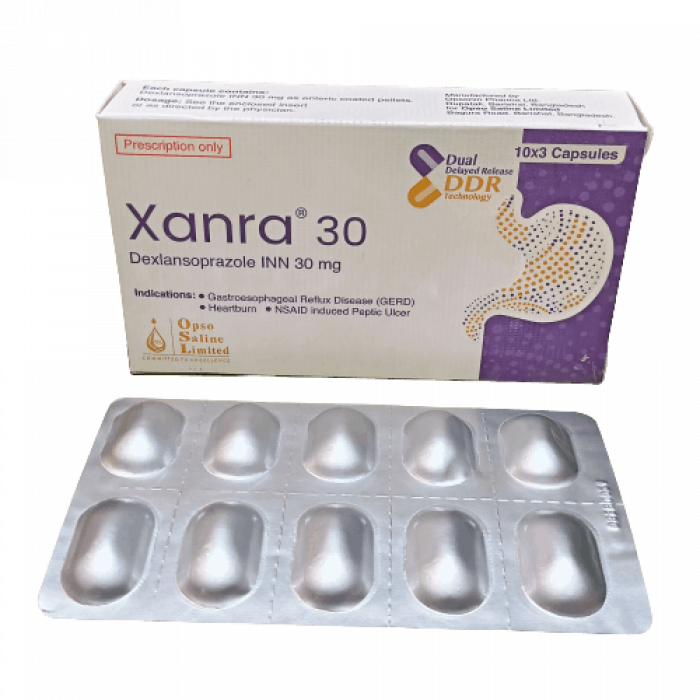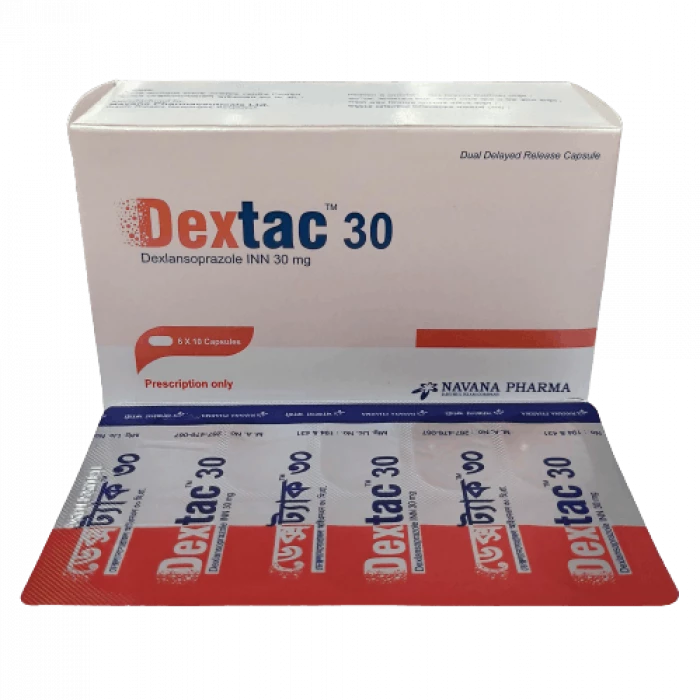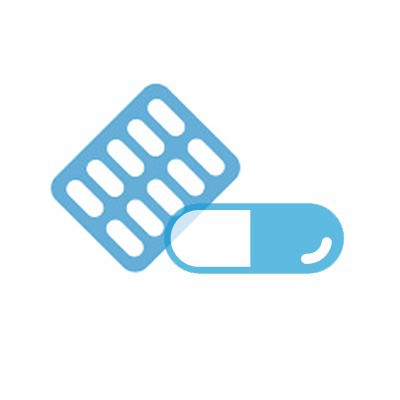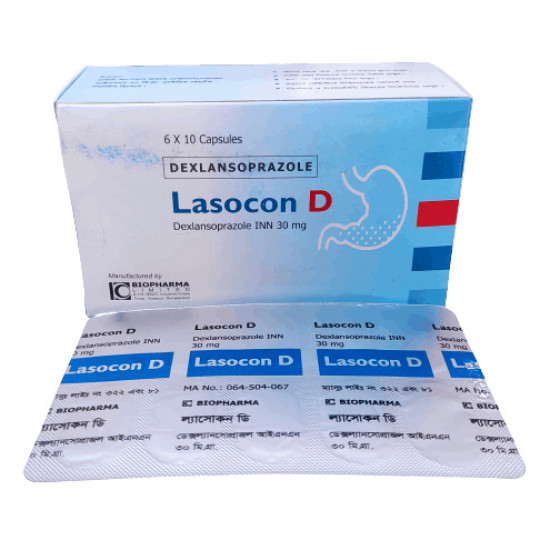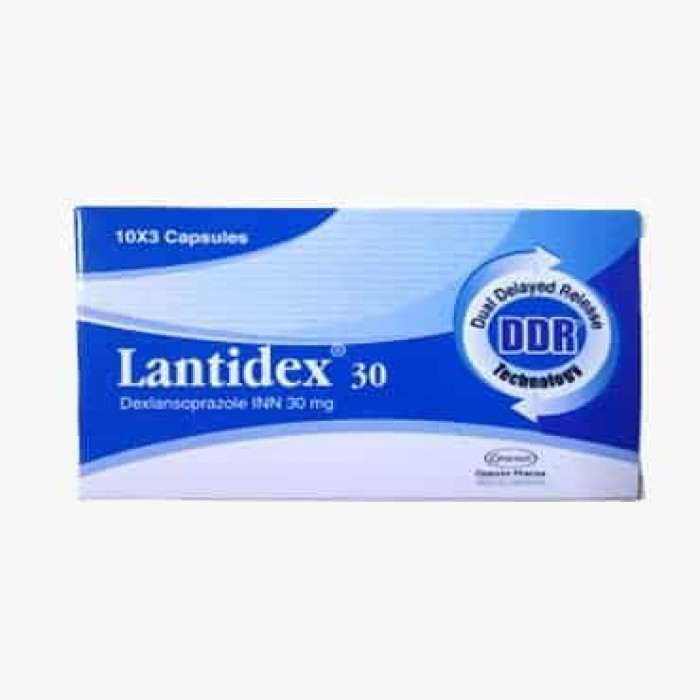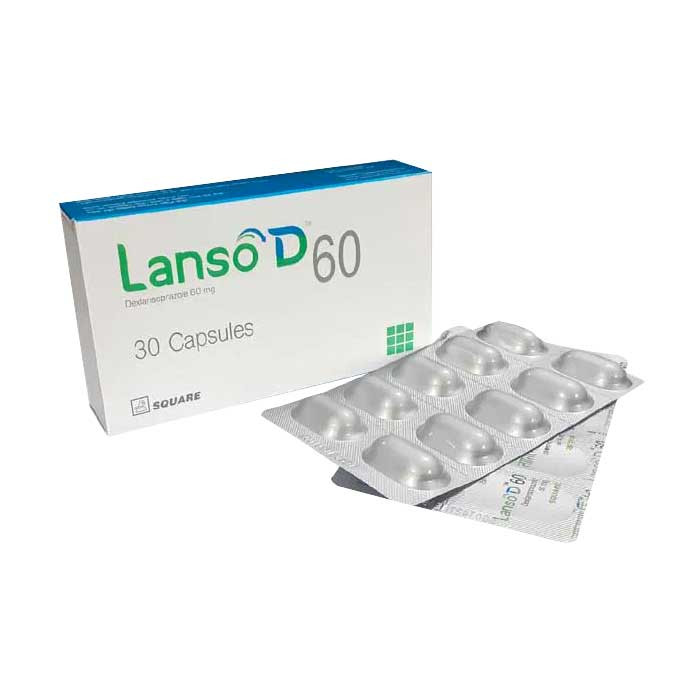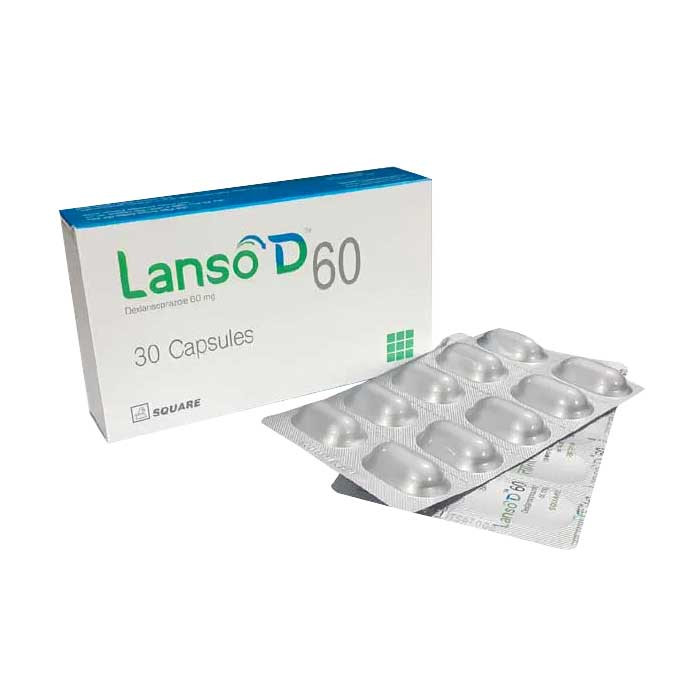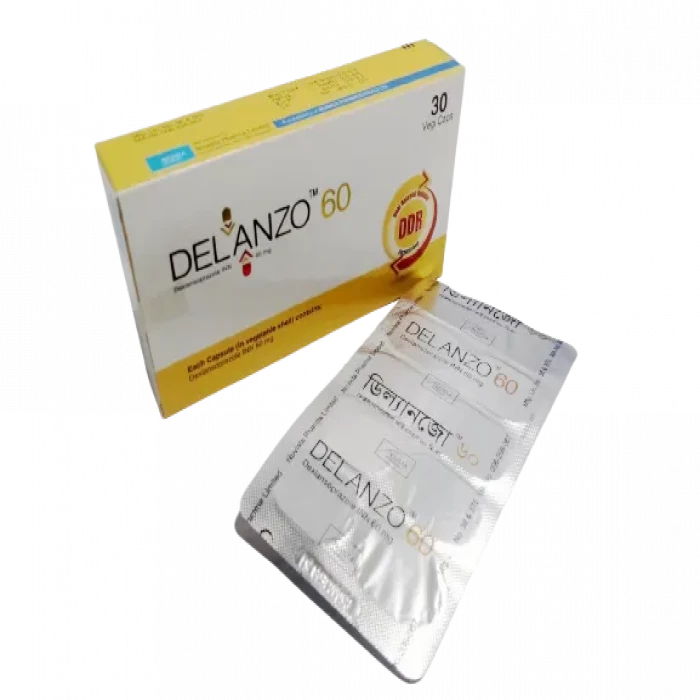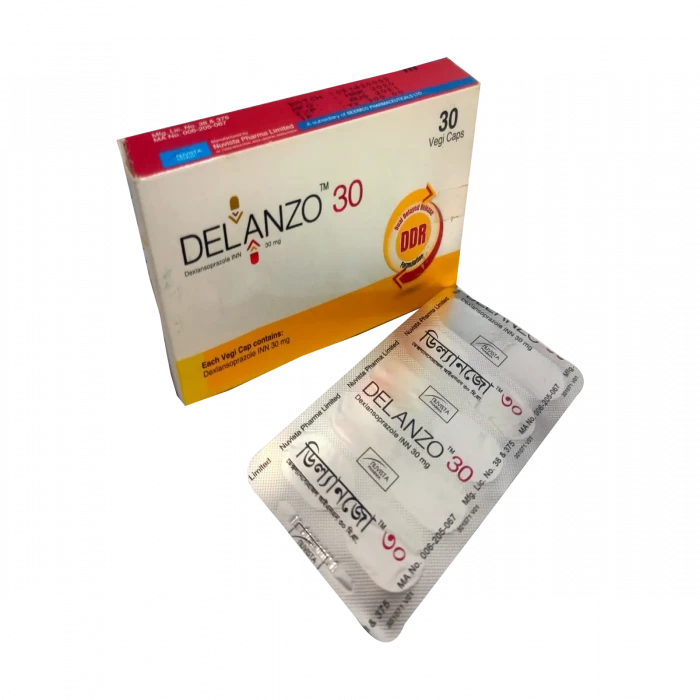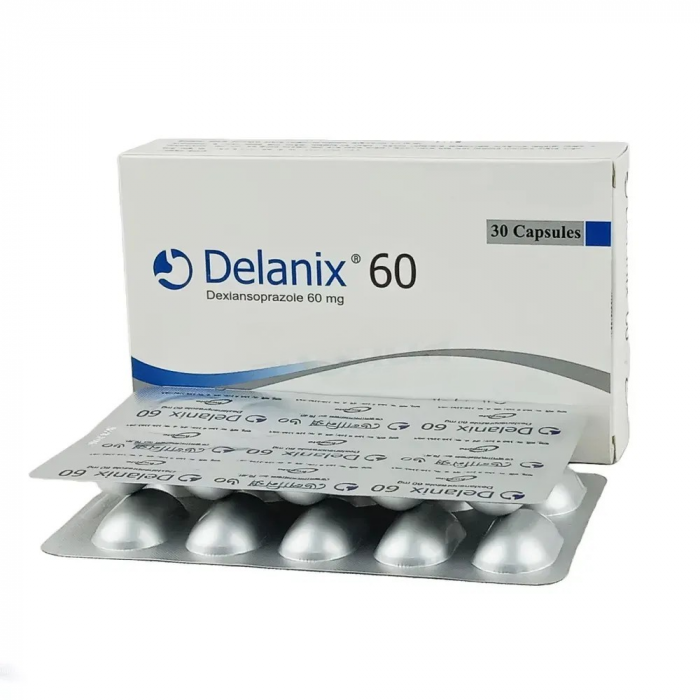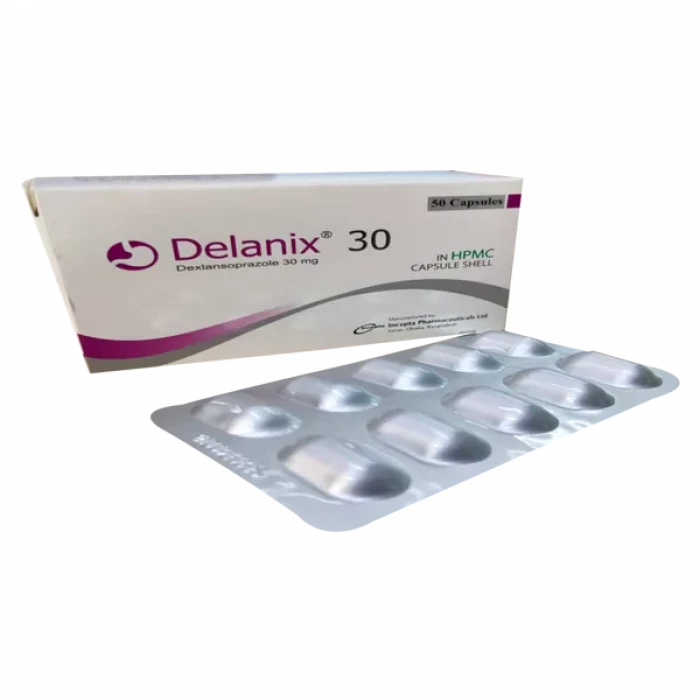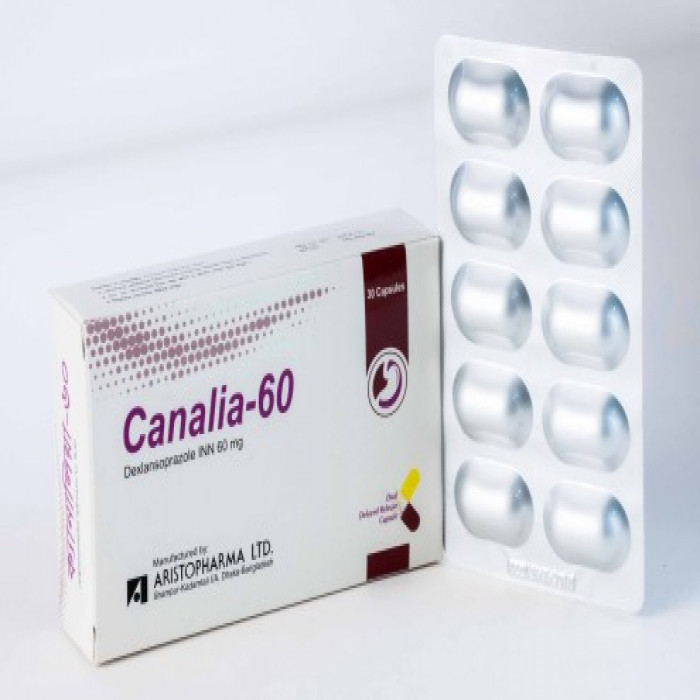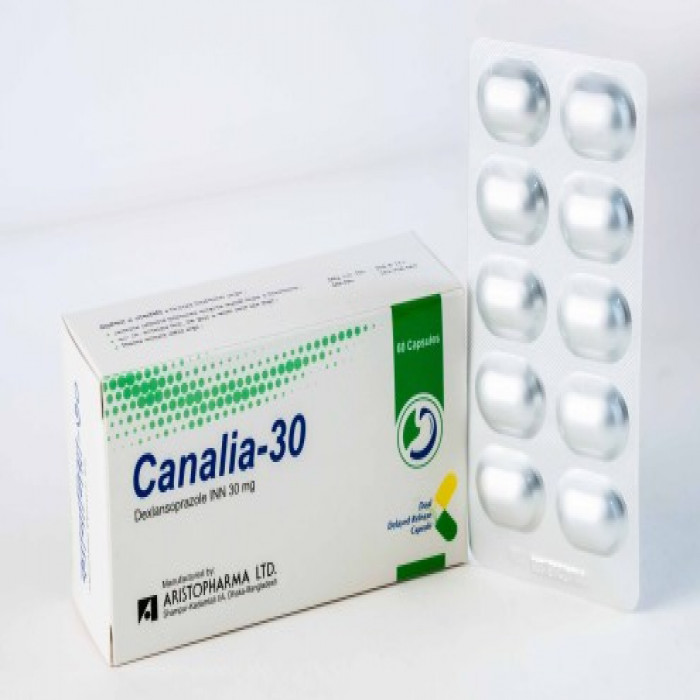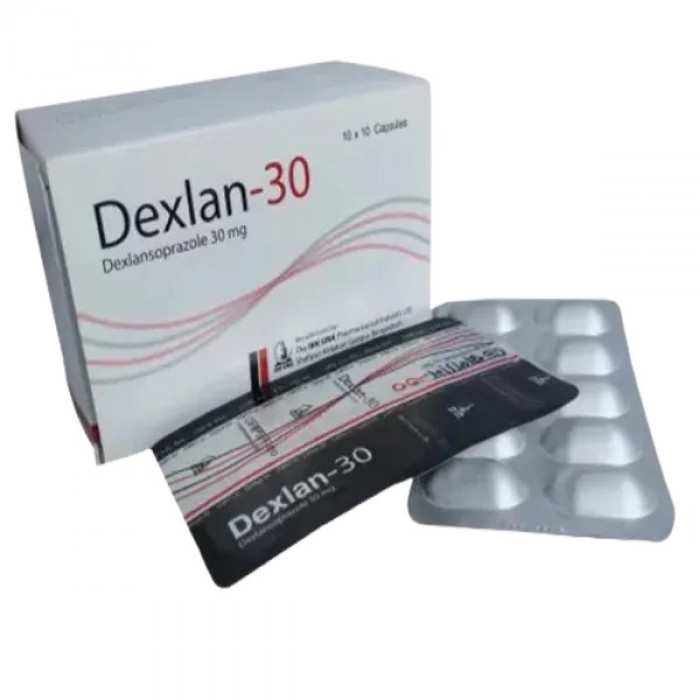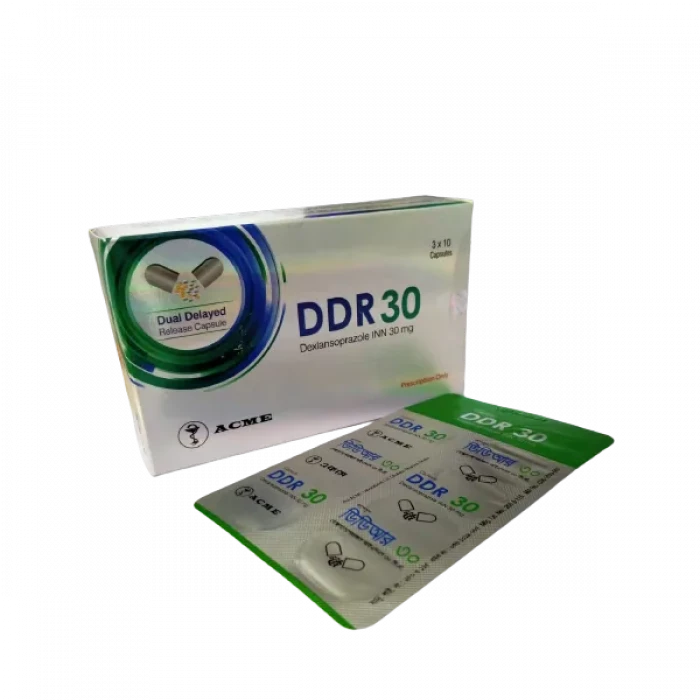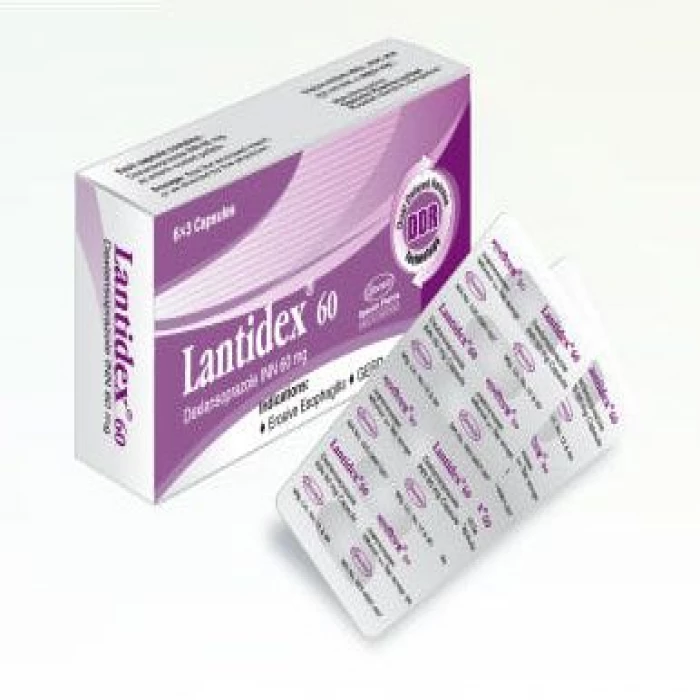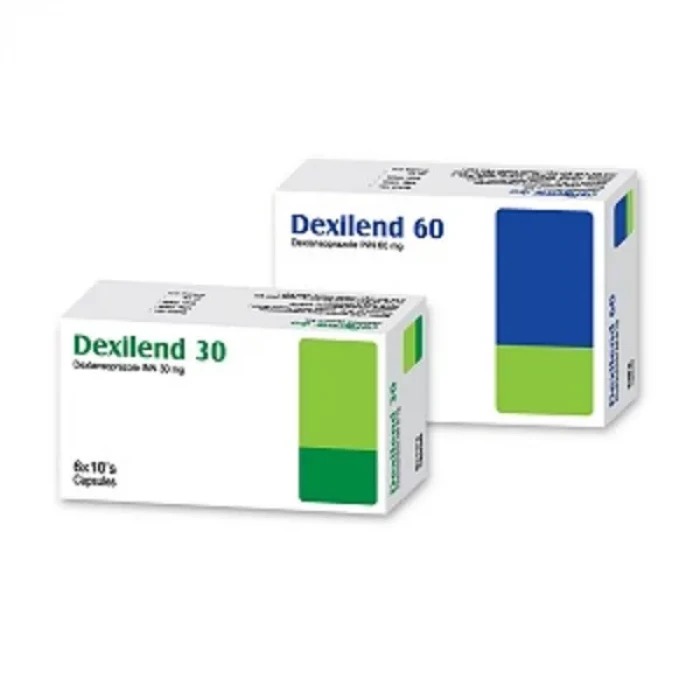Due to National Election, orders may be processed slight delay, nationwide.
Leading Online Pharmacy of Bangladesh
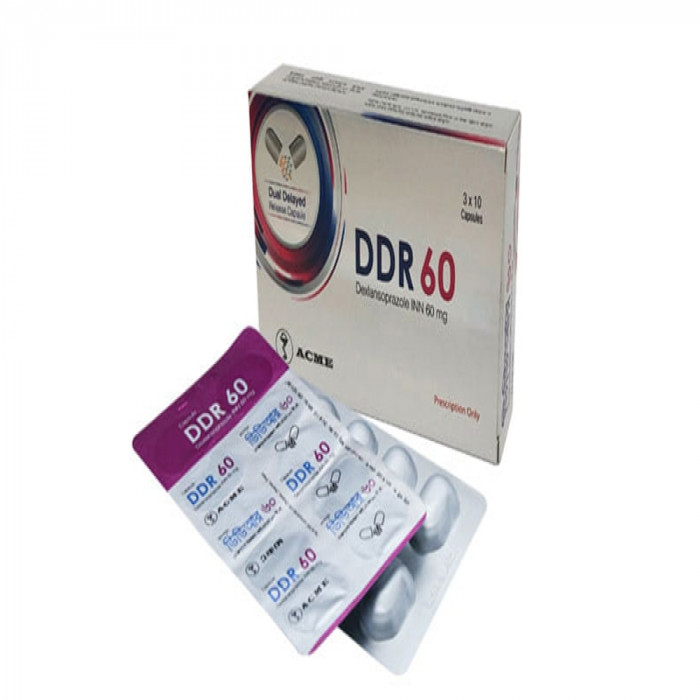
✔ 100% Authentic Product
👁️ Currently Viewing 2580
Dexlansoprazole is classified as a proton pump inhibitor (PPI) and belongs to the group of antiulcer medicines.
Discount
Price: ৳ 171
MRP:
৳
180
5%
Off

100% Genuine Products, Guaranteed

Safe & Secure Payments, Always

Fast, Secure & Efficient Delivery

Proper Packaging
 Cash on Delivery - All over Bangladesh
Cash on Delivery - All over Bangladesh Regular Delivery - 12-24 Hours, Dhaka City* Charge Tk.39-59
Regular Delivery - 12-24 Hours, Dhaka City* Charge Tk.39-59 Regular Delivery - 24-48 Hours, Other Cities* Charge Tk.99-110
Regular Delivery - 24-48 Hours, Other Cities* Charge Tk.99-110
 ফ্রি ডেলিভারিঃ - ৯৯৯ টাকা+ অর্ডারে, ঢাকা
শহরে
ফ্রি ডেলিভারিঃ - ৯৯৯ টাকা+ অর্ডারে, ঢাকা
শহরে ফ্রি ডেলিভারিঃ - ২৯৯৯ টাকা+ অর্ডারে, ঢাকার
বাহিরে
ফ্রি ডেলিভারিঃ - ২৯৯৯ টাকা+ অর্ডারে, ঢাকার
বাহিরে
100% Genuine Products, Guaranteed
Safe & Secure Payments, Always
Fast, Secure & Efficient Delivery
Proper Packaging
 Cash on Delivery - All over Bangladesh
Cash on Delivery - All over Bangladesh Regular Delivery - 12-24 Hours, Dhaka City* Charge Tk.39-59
Regular Delivery - 12-24 Hours, Dhaka City* Charge Tk.39-59 Regular Delivery - 24-48 Hours, Other Cities* Charge Tk.99-110
Regular Delivery - 24-48 Hours, Other Cities* Charge Tk.99-110 ফ্রি ডেলিভারিঃ - ৯৯৯ টাকা+ অর্ডারে, ঢাকা
শহরে
ফ্রি ডেলিভারিঃ - ৯৯৯ টাকা+ অর্ডারে, ঢাকা
শহরে ফ্রি ডেলিভারিঃ - ২৯৯৯ টাকা+ অর্ডারে, ঢাকার
বাহিরে
ফ্রি ডেলিভারিঃ - ২৯৯৯ টাকা+ অর্ডারে, ঢাকার
বাহিরে
✅ Description:
- Treatment of excess stomach acid, commonly known as heartburn or acid reflux.
- Relief from complications such as difficulty swallowing, persistent cough, esophageal damage, and prevention of ulcer formation.
Safety Advices

Alcohol
UNSAFE
Consuming a large amount of alcohol can increase acidity and cause acid reflux, leading to heartburn. This can decrease the effectiveness of the medication and worsen your underlying condition.

Pregnancy
CONSULT YOUR DOCTOR
DDR 60mg Capsule is likely safe to use during pregnancy. While animal studies have shown no or low adverse effects on the fetus, there is limited human data. Consulting your doctor is recommended.

Breastfeeding
CONSULT YOUR DOCTOR
There is not enough information from human or animal studies to determine the safety of DDR 60mg Capsules during breastfeeding. It's advisable to consult your doctor if you have concerns.

Driving
CAUTION
DDR 60mg Capsule does not interact with your ability to drive, so no dose adjustment is needed.

Kidney
CONSULT YOUR DOCTOR
This medication does not affect kidney function, and no dose adjustment is required for patients with renal impairment.

Liver
CONSULT YOUR DOCTOR
Patients with mild to moderate liver disease do not require dose adjustment. However, it is not advisable for patients with severe liver disease.
✔️ Uses of DDR 60mg Capsule
- Acidity
- Heartburn
- Intestinal Ulcer
- Stomach Ulcers
✔️ How does DDR 60mg Capsule work?
This medication is one of the proton pump inhibitors that work by reducing the level of acid in the stomach. Hence, the medicine is used to treat gastroesophageal reflux disease (GERD) which causes heartburn and heals the damage done to the esophagus by the acid.
✔️ Side Effects of DDR 60mg Capsule
Abdominal pain, Diarrhea, Flatulence, Nausea, Vomiting, Upper respiratory tract infection, Headache
✔️ Quick Suggestions:
- Eat smaller, more frequent meals to prevent overeating.
- Maintain a healthy weight through regular exercise.
- Avoid lying down immediately after eating to prevent acid reflux.
- Practice relaxation techniques like yoga or meditation to reduce stress, which can trigger acidity.
- Avoid wearing tight-fitting clothes that may increase abdominal pressure and contribute to acid reflux.
- Limit or avoid certain trigger foods, such as high-fat foods, spicy foods, chocolates, citrus fruits, pineapple, tomatoes, onions, garlic, tea, and soda.
- Avoid prolonged sitting; take short breaks every hour to engage in brisk walking or stretching.
- Quit smoking and reduce alcohol consumption as they can exacerbate acidity.
- Inform your doctor if you are scheduled to have a Chromogranin A blood test.
✔️ Indication
DDR 60mg Capsule is a medication that reduces the production of stomach acid. It is prescribed to treat various stomach and intestinal conditions caused by excessive acid production, including heartburn, acid reflux, peptic ulcer disease, and other stomach conditions. It is also used to prevent acidity and stomach ulcers that may result from long-term use of painkillers.
✔️ Pharmacology
Dexlansoprazole, the active ingredient in DDR 60mg Capsule, belongs to a class of drugs known as proton pump inhibitors (PPIs). It works by specifically blocking (H + / K +) ATPase in gastric parietal cells, which inhibits the secretion of gastric acid. By targeting the proton pump, dexlansoprazole prevents the final step of acid production. It is the enantiomer of lansoprazole, which is a racemic mixture of R and the enantiomer. Dexlansoprazole is available in a dual delayed-release (DDR) formulation in an oral capsule. This capsule contains two types of enteric-coated granules with different pH-dependent dissolution profiles. This results in two different peak plasma concentration-time profiles for dexlansoprazole: the first peak occurs 1 to 2 hours after administration, followed by the second peak within 4 to 5 hours. When taken orally, the Cmax and AUC values of dexlansoprazole increase approximately in proportion to the dose. Dexlansoprazole is metabolized extensively in the liver and is eliminated in the urine.
✔️ Dosage & Administration of DDR 60mg Capsule
The dosage recommendations for Dexlansoprazole in adults and children are as follows:
Adult Dose:
Erosive Esophagitis (Healing):
- Capsule: 60 mg orally once a day for up to 8 weeks.
Erosive Esophagitis (Maintenance):
- Capsule or Delayed-Release (DR): 30 mg orally once a day for up to 6 months.
Gastroesophageal Reflux Disease (GERD):
- Capsule or DR: 30 mg orally once a day for 4 weeks.
Hepatic Impairment:
- For individuals with mild hepatic impairment (Child-Pugh Class A), no dose adjustment is necessary.
- For those with moderate hepatic impairment (Child-Pugh Class B), the dose should not exceed 30 mg per day.
- Dexlansoprazole is not recommended for individuals with severe hepatic impairment (Child-Pugh Class C).
Child Dose:
- Dexlansoprazole safety and efficacy have not been established for children under 12 years of age.
- For children aged 12 years and older, the recommended doses for Erosive Esophagitis, Erosive Esophagitis Maintenance, and Gastroesophageal Reflux Disease are the same as those for adults.
DDR 60mg Capsule can be taken without consideration of diet, and it should be swallowed whole. However, you can also take it one hour before a meal, preferably in the morning. DDR 60mg Capsule is well-tolerated and provides long-term relief. It's important to avoid eating late at night or just before bedtime. If you experience watery diarrhea, a fever, or persistent stomach pain, inform your doctor. Also, let your doctor know if you don't feel better after taking the medication for 14 days, as this may indicate an underlying issue. Long-term use of DDR 60mg may lead to weakened bones and a deficiency of minerals like magnesium. Your doctor may recommend calcium and magnesium supplements to reduce the risk. If you experience decreased urination, swelling, lower back pain, nausea, fatigue, rash, or fever, contact your doctor immediately, as these could be signs of a kidney problem.
✔️ Interaction
Drug-Drug Interactions:
- Painkillers (e.g., aspirin, naproxen)
- Antidepressants (e.g., duloxetine, amitriptyline)
- Blood thinners (e.g., clopidogrel)
- Hypothyroidism medication (e.g., levothyroxine)
- Antiretroviral drugs used to treat HIV (e.g., atazanavir)
- Antifungal medications (e.g., ketoconazole, itraconazole)
- Methotrexate, a medication used in cancer treatment
- Vitamin supplements (e.g., cyanocobalamin)
- Medications that help with sleep or relaxation (e.g., diazepam, zolpidem)
It's important to inform your healthcare provider of all the medications you are taking, including over-the-counter drugs and supplements. This can help prevent potential interactions.
Drug-Food Interactions:
Smoking: Smoking can contribute to the development of stomach ulcers and may reduce the effectiveness of Dexlansoprazole in healing and preventing ulcers. Quitting smoking is often recommended.
Alcohol: Alcohol intake can increase the production of stomach acid, potentially leading to increased acidity and heartburn. It's advisable to avoid alcohol consumption while taking Dexlansoprazole
Drug-Disease Interactions:
Dexlansoprazole an interacts with various medical conditions:
Clostridium difficile-associated diarrhea: There is a potential risk of developing this type of diarrhea while taking Dexlansoprazole.
Bone Fractures: Long-term use of Dexlansoprazole may be associated with an increased risk of bone fractures, particularly in the hip, wrist, or spine. It's important to discuss this risk with your healthcare provider and consider measures to maintain bone health.
Severe Liver Disease: Caution is advised when using Dexlansoprazole, especially in individuals with a history of severe liver disease. Dose adjustments may be necessary.
Low Bone Mineral Density (Osteopenia): People with reduced bone mineral density may be at a higher risk of bone fractures when taking Dexlansoprazole.
Low Levels of Magnesium in the Blood: Dexlansoprazole may lead to hypomagnesemia (low magnesium levels). It's important to be aware of the symptoms of magnesium deficiency, such as muscle spasms, irregular heartbeat, and seizures. Your healthcare provider may recommend magnesium supplements.
✔️ Contraindications
Hypersensitivity.
✔️ Pregnancy & Lactation
Pregnancy: There have been no specific studies conducted on the use of dexlansoprazole in pregnant women to determine its effects. Dexlansoprazole is the R-enantiomer of lansoprazole, and available observational studies of lansoprazole use during pregnancy have not shown an association with adverse pregnancy-related outcomes. In animal studies, where lansoprazole (the precursor to dexlansoprazole) was given to rats during organogenesis through lactation at a dose equivalent to 1.8 times the maximum recommended human dexlansoprazole dose, it led to reductions in femur weight, femur length, crown-rump length, and growth plate thickness (in males only) on postnatal day 21. These effects were associated with a decrease in body weight gain. Pregnant women should be advised of the potential risk to the fetus.
Lactation: There is no information available regarding the presence of dexlansoprazole in human milk, its effects on breastfed infants, or its impact on milk production. However, it's known that lansoprazole and its metabolites are present in rat milk. When considering the use of dexlansoprazole, it's important to weigh the developmental and health benefits of breastfeeding against the mother's clinical need for therapy and the potential adverse effects on the breastfed child, both from the therapy and the underlying maternal condition. If you are pregnant or breastfeeding and considering the use of dexlansoprazole, it's advisable to consult with your healthcare provider to discuss the potential risks and benefits.
✔️ Precaution & Warnings:
It is also crucial to avoid alcohol consumption while taking DDR 60mg Capsules. Additionally, this medication should be used with caution if you have liver or kidney conditions, and you should contact your doctor if you experience certain side effects like nausea, abdominal pain, flatulence, diarrhea, or vomiting. If you are pregnant or breastfeeding, consult your doctor before taking DDR 60mg Capsule.
✔️ Storage Conditions
It should be stored below 30°C in a dry place, protected from light, and out of reach of children.
⚠️Disclaimer:
At ePharma, we’re committed to providing accurate and accessible health information. However, all content is intended for informational purposes only and should not replace medical advice from a qualified physician. Please consult your healthcare provider for personalized guidance. We aim to support, not substitute, the doctor-patient relationship.




